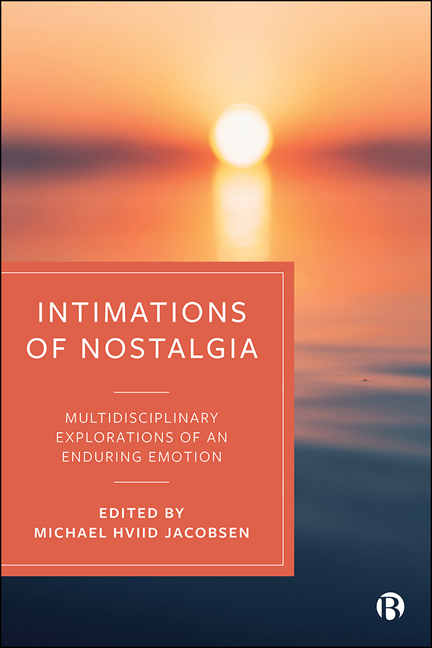Book contents
- Frontmatter
- Contents
- Notes on Contributors
- Preface and Acknowledgements
- Introduction: The Many Different Faces of Nostalgia – Exploring a Multifaceted and Multidisciplinary Emotion
- 1 Philosophy and Nostalgia: ‘Rooting’ within the Nostalgic Condition
- 2 History and Nostalgia: Historicizing a Multifaceted Emotion
- 3 Political Theory and Nostalgia: The Power of the Past in the History of Political Thought
- 4 Sociology and Nostalgia: Micro-, Meso-and Macro-level Dimensions of an Ambiguous Emotion
- 5 Psychology and Nostalgia: Towards a Functional Approach
- 6 Anthropology and Nostalgia: Between Hegemonic and Emancipatory Projections of the Past
- 7 Media Studies and Nostalgia: Media Philosophy and Nostalgizing in Times of Crisis
- 8 Marketing and Nostalgia: Unpacking the Past and Future of Marketing and Consumer Research on Nostalgia
- 9 Literature and Nostalgia: Vestiges of Paradise
- 10 Architecture and Nostalgia: The End of History, the End of the Future and the Prospect of Nostalgia
- Postscript: On Nostalgia of the Future and the Future of Nostalgia – Some Scattered Concluding Observations
- Index
4 - Sociology and Nostalgia: Micro-, Meso-and Macro-level Dimensions of an Ambiguous Emotion
Published online by Cambridge University Press: 13 May 2022
- Frontmatter
- Contents
- Notes on Contributors
- Preface and Acknowledgements
- Introduction: The Many Different Faces of Nostalgia – Exploring a Multifaceted and Multidisciplinary Emotion
- 1 Philosophy and Nostalgia: ‘Rooting’ within the Nostalgic Condition
- 2 History and Nostalgia: Historicizing a Multifaceted Emotion
- 3 Political Theory and Nostalgia: The Power of the Past in the History of Political Thought
- 4 Sociology and Nostalgia: Micro-, Meso-and Macro-level Dimensions of an Ambiguous Emotion
- 5 Psychology and Nostalgia: Towards a Functional Approach
- 6 Anthropology and Nostalgia: Between Hegemonic and Emancipatory Projections of the Past
- 7 Media Studies and Nostalgia: Media Philosophy and Nostalgizing in Times of Crisis
- 8 Marketing and Nostalgia: Unpacking the Past and Future of Marketing and Consumer Research on Nostalgia
- 9 Literature and Nostalgia: Vestiges of Paradise
- 10 Architecture and Nostalgia: The End of History, the End of the Future and the Prospect of Nostalgia
- Postscript: On Nostalgia of the Future and the Future of Nostalgia – Some Scattered Concluding Observations
- Index
Summary
Introduction
Let it already from the outset of this chapter be stressed, nostalgia is not a conventional preoccupation among sociologists, it is not a hot potato ranking high in most research agendas and it is a topic only seldom taught in its own right in sociology classes. Despite this, nostalgia is in fact a phenomenon that sociologists should take seriously, not least because it is very informative about many different aspects of society or ‘the social’, which is the subject matter of sociology often defining itself as the ‘science of society’. However, looking through most sociology books, the topic of nostalgia has – until recently – been conspicuous primarily by its absence (Jacobsen 2020a). This situation also once made Roland Robertson remark that ‘we lack a sociological, as opposed to a psychological, theory of nostalgia’ (Robertson 1992: 146). Perhaps we do not so much lack ‘a theory’ (in the singular) but, rather, a more substantial sociological interest in theorizing and empirically exploring nostalgia. Not much has drastically changed since Robertson's call for a sociological interest in nostalgia. This is truly a shame and quite surprising, because nostalgia offers such an important lens for understanding many other aspects of social life such as, for example, history, identity, self, culture, memory and social structure. Some of these core sociological concerns will be sent in circulation around the topic of nostalgia throughout this chapter.
This chapter thus aspires to highlight some important contributions to the study of nostalgia from the field of sociology. Sociology offers a unique and valuable perspective from which to study nostalgia. Sociologists are especially apt to emphasize that the conceptualizations, experiences and uses of nostalgia are variable – historically, culturally and socially. Even though many sociologists have conventionally been critical of nostalgia (see, for example, Elliott and Turner 2012), in some ways it could be said that the birth of the discipline itself had a strong nostalgic underpinning. Sociology was a child of a tumultuous era in the mid-19th century marking an intellectual steppingstone between premodern feudal society and modern industrialized society. In this way, sociology is a product of modernity and the modern mind, of a scientific quest to understand the drastic changes taking place in the Western world at the threshold between traditional and modern society.
- Type
- Chapter
- Information
- Intimations of NostalgiaMultidisciplinary Explorations of an Enduring Emotion, pp. 89 - 109Publisher: Bristol University PressPrint publication year: 2021



